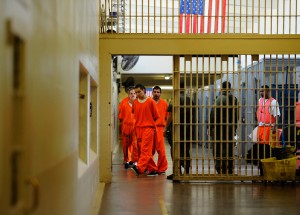"It's unfortunate that the judge didn't give the appropriate weight to reports by national experts who found that CDCR is providing constitutional mental health care to inmates, and in fact, is a model for the nation," Deborah Hoffman, spokeswoman for the agency, said in a statement. "We will appeal this decision and are confident that we will prevail. It's time for this costly and intrusive lawsuit — now in its 23rd year — to come to an end."
The ruling also undermines Brown's efforts to lift a separate court order that otherwise will force the state to reduce its prison population by nearly 10,000 by year's end.
The judge and attorneys for both sides acknowledged that the state has made significant improvements in its treatment of mentally ill inmates since the lawsuit was filed in 1991. That suit claimed care at the time was so poor it violated the Constitution's ban on cruel and unusual punishment, prompting federal supervision to be imposed four years later.
The state has spent more than $1 billion on new facilities and devotes $400 million a year to caring for the mentally ill, who account for about one in every four inmates in the state's 33 adult prisons. The administration has argued that it no longer is deliberately indifferent to the needs of mentally ill inmates.
Yet court-appointed experts reported that the prison system still has major problems. That includes a suicide rate that worsened last year to 24 per 100,000 inmates, far exceeding the national average of 16 suicides per 100,000 inmates in state prisons.
Despite the state's efforts to build more mental health facilities and hire more staff at higher salaries, attorneys representing inmates said more needs to be done. In his ruling, Karlton agreed.
"Systemic failures persist in the form of inadequate suicide prevention measures, excessive administrative segregation of the mentally ill, lack of timely access to adequate care, insufficient treatment space and access to beds, and unmet staffing needs," the judge wrote.
The judge further said the state could not be trusted to continue the improvements if court oversight was lifted.
"There is overwhelming evidence in the record that much of defendants' progress to date is due to the pressure of this and other litigation," he wrote.
Four experts hired by the state said they found adequate care at the 13 prisons they visited last year. But the judge sharply criticized the state for letting those experts talk to mentally ill inmates without notifying their attorneys.
The lapse was such a major breach of professional ethics that the judge discarded the experts' opinions that formed the core of the state's case. Without them, Karlton said he had no choice but to dismiss the state's motion to terminate the lawsuit for lack of evidence.
However, he also noted that he would have made the same ruling even if the opinions were allowed.
Hoffman, the corrections department spokeswoman, said there was nothing unethical about their evaluations.
The judge was upset that he had no opportunity to question both sides' experts before making a decision because of the strict 90-day deadline set by Congress under the 1996 Prison Litigation Reform Act. Brown started the clock running in January when he filed the motion to end the class-action lawsuit.
Attorneys for inmates said the state would be better off improving conditions for the mentally ill than spending more time and money on a lengthy appeals process.
"Instead of wasting the taxpayers' money on an appeal, why not use that money to fix the problems?" lawyer Ernie Galvan said.
He said the lawsuit had allowed "a bright light to be shown into the darkest recesses of the prison system" and that Friday's decision confirmed that unconstitutional conditions remain.
The state's prison medical system also has been under federal court supervision. The courts have said prison overcrowding has been the main culprit, leading to an order to greatly reduce the inmate population.
The population cap was upheld by the U.S. Supreme Court in 2011, but the state has been unable to reach the required level despite enacting Brown's so-called realignment law, which requires lower-level offenders to serve their sentences in county jails instead of state prison.
